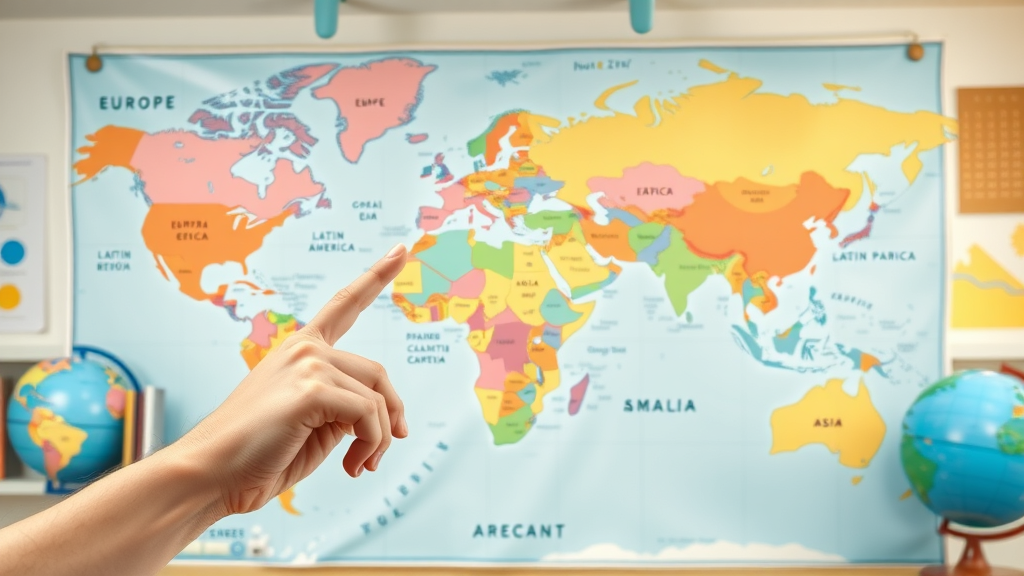
"Leaving home isn’t just about changing your address—it’s about reimagining your life, your purpose, and the world you want to build."
Have you ever felt that stirring call for change—a pull far beyond American city lights, compelling you to create a new story in a brand-new place? Moving out of the United States can be exhilarating and life-changing, but without proper planning, it’s easy to fall into costly traps that turn dreams into regrets. This guide is your go-to resource for navigating the twists and turns of moving abroad—emotionally, financially, and practically. You’ll discover what it truly means to embark on this journey, find clarity amid the overwhelming visa programs and bureaucracy, and learn strategies so you don’t just move—you thrive.
Whether you’re drawn by adventure, new economic opportunities, or a better quality of life, this article shares insider knowledge, common mistakes, and actionable checklists to empower your transition. Before booking those international tickets, dive in, and build the confident foundation for your next chapter. Welcome to your future—forged by smart choices, not regrets.
Life-Changing Decisions: Why Moving Out of the United States Demands Careful Planning
Uprooting your life and moving out of the United States is more than just facing a change of scenery. It’s a profound decision that affects every aspect of your life—from career and family relationships to financial planning and your own emotional well-being. Each year, thousands make the leap, inspired by stories on social media or the promise of a lower cost of living in a foreign country. However, the reality is that moving abroad demands far more than a suitcase and a dream. Without meticulous preparation and a firm grasp of visa requirements, healthcare systems, and cultural differences, the journey can quickly devolve into stress and costly mistakes.
Consider the stories of those who underestimated the challenges, only to face rigid immigration law, denied visas, or financial shortfalls. The process involves more than just a desire to live abroad; it requires a thoughtful examination of what you value: Do you want better work opportunities? A different pace of life? Access to a new education system for your children? Making lists, researching each relevant visa program (such as golden visa or digital nomad visas), and preparing emotionally for the unknown are crucial steps.
Facing the Unknown: The Emotional Challenges of Moving Abroad
One of the most overlooked aspects of moving abroad is managing the whirlwind of emotions that accompanies such a massive transition. Leaving familiar neighborhoods, trusted social circles, and the comfort of routine can usher in waves of excitement and anxiety. The sense of dislocation can be intense—especially in the first few months—when the reality of living abroad replaces the initial exhilaration. It’s common for expats to experience homesickness, culture shock, and even uncertainty about their choice during this period.
Establishing a support network early can make all the difference. Many successful expats emphasize the importance of joining local communities, staying connected with loved ones through social media, and being patient with yourself during cultural adaptation. Remember, emotions will ebb and flow, but with intent, resilience, and resources, you’ll soon create a sense of belonging in your new home.
Avoiding Costly Mistakes When You Move Abroad
Financial missteps and poor legal planning are among the top regrets for U.S. citizens moving out of the United States. From expired or incorrect visas to underestimated living costs, the risks are significant—and usually expensive to fix. Thorough research and listening to first-hand accounts can help navigate these threats. Don’t underestimate how differently countries handle residency, health insurance, or banking. What seems like a small oversight—such as not updating your Social Security or failing to declare foreign accounts—can snowball into tax penalties or even denied entry.
- Ignoring visa requirements and residency laws
- Underestimating the cost of living abroad
- Overlooking quality of life differences
- Failing to understand international health care options
- Misjudging access to economic opportunities
Crucial Factors When Moving Out of the United States

Every relocation hinges on understanding the rules that shape your journey—especially visa programs, living costs, and the availability of essential services like healthcare, banking, and education. Many countries offer an array of visa types, each with distinct requirements, costs, and application processes. Misreading these could leave you without legal residency, limited access to local services, or—worst-case—forced repatriation. Making informed decisions about where and how to move abroad increases the odds of a successful transition.
It’s essential to weigh more than just your personal preferences. Research each destination for its political stability, healthcare infrastructure, expat support networks, and long-term economic opportunities. Comparing options like the golden visa (for investors), digital nomad visa (for remote workers), or straightforward retirement visas streamlines your path and prevents hidden issues down the line.
Understanding Visas, Golden Visa Programs, and Digital Nomad Laws
Visa programs are often the gatekeepers of your dream to live abroad. Some countries, like Portugal and Spain, offer golden visa or digital nomad visas—inviting investors, retirees, or remote workers to secure residency with financial or occupational proof. Others, such as Mexico, maintain affordable residency permits requiring less stringent financial qualifications. Failing to understand the nuances—income verification, application timing, or renewal deadlines—can jeopardize your stay or even result in deportation.
Take Portugal’s golden visa as an example: it attracts global investors by offering a path to permanent residency in exchange for property or business investment. Remote workers might favor Spain’s digital nomad visa, which mandates ongoing remote employment and a clear background check. Each choice presents pros, cons, and financial implications. It’s critical to assess which visa program aligns with your skills, resources, and long-term aspirations.
| Country | Visa Type | Requirements | Duration | Cost |
|---|---|---|---|---|
| Portugal | Golden Visa | Investment, Proof of Income | 5 years | $$$ |
| Spain | Digital Nomad | Remote Income, Background Check | 1 year | $$ |
| Mexico | Temporary Resident | Proof of Income | 1-4 years | $ |
How the Cost of Living Abroad Differs Dramatically

The cost of living is one of the main motivators for moving out of the United States; however, the reality often surprises new arrivals. While destinations like Mexico or Thailand promise affordable daily expenses, cities such as Paris, Sydney, or even some European countries can be as costly or pricier than major US metro areas. Hidden costs—including transportation, utilities, and mandatory local health insurance—quickly add up.
It’s vital to look beyond headline rental prices. Factor in imported goods, cultural activities, dining habits, education system fees, and variable utility costs. Budgeting accurately for “real” living costs ensures you aren’t caught off guard. Online expat forums and recent guides can provide updated, location-specific insights to avoid budgeting disasters. Never assume familiar expenses will translate seamlessly after your transition—converting dollars to local currency can bring some costly surprises.
Quality of Life Considerations When Moving Abroad
Quality of life is about more than just the numbers in your monthly budget; it’s the sum of your comfort, opportunity, and well-being. High quality of life destinations offer robust public transportation, ample green spaces, high safety standards, and a welcoming social atmosphere for expats. For some, a slower pace abroad translates to less stress, while others miss the fast rhythm and convenience of the United States.
Evaluate each new country’s cultural vibrancy, ease of integration, and support for foreigners. Local attitudes toward Americans, access to desired recreation, and overall happiness indexes are essential for a fulfilling experience. Some quality of life elements can’t be measured in cost—they are found in everyday encounters, community participation, and local traditions that either enrich or challenge your sense of belonging.
Choosing the Right Country Based on Education Systems and Family Needs
For families and parents, education is a critical factor in finding the ideal overseas experience. Each country offers a unique education system, varying from highly regulated public schools to diverse international and private academies. Some nations have strong bilingual education programs; others demand rapid integration into the local language and curriculum.
Research school reputation, curriculum alignment with U.S. standards, and whether expat families easily transition. The availability of English-speaking teachers, multicultural environments, and support services should weigh into your decision, especially if the move includes minor children or a family member with special education needs. The right fit will ease the adaptation process and enhance your overall quality of life abroad.
Transitioning from the United States: Overlooked Details That Can Cost You
Even after securing all necessary visas, moving out of the United States comes with a maze of overlooked paperwork and logistical requirements. Healthcare coverage, tax obligations, and even simple tasks—like keeping a U.S. phone number—can trip up the most seasoned travelers. Dive deep into each requirement, and you’ll avoid regret, fines, or dangerous coverage gaps.
Keeping current on US-side obligations (like social security or IRS filings) while meeting your host country’s paperwork is crucial. The best-prepared expats plan well in advance, using expert advice to handle everything from prescription refills to international banking access.
Health Insurance Gaps After Moving Out of the United States
Many Americans mistakenly believe their U.S.-based health insurance provides international coverage. In reality, most plans—excluding a few expensive global options—offer little to no support when you’re abroad. Some overlook medical insurance requirements embedded in their new country’s visa program. Don’t risk hefty foreign hospital bills or fall foul of residency renewals due to non-compliance.
Research all available plans—public, private, and hybrid—before your move. Factor in language barriers at local clinics, coverage differences, and the potential need for evacuation coverage if local healthcare is limited. The smartest expats arrange coverage before departing and keep documentation accessible for border checks and emergencies.
Banking, Taxes, and Financial Pitfalls for US Citizens Moving Abroad
U.S. tax law follows citizens abroad—meaning you’ll still file annually with the IRS, regardless of your new home. Overlooking banking requirements, foreign account disclosures (like FBAR), or the double taxation risk can lead to audits and severe penalties. Some expats find their U.S. banks close accounts after foreign address changes, creating a scramble for access to funds.
Open international-friendly accounts, maintain ties with at least one U.S. institution, and consult advisors familiar with cross-border finances. Explore tax treaties between the U.S. and your new country, understand required reporting (including on crypto or investments), and plan for how you’ll pay local utility or school fees from abroad.
Adapting to Different Economic Opportunities Abroad
The economic opportunities that drew you overseas may look different once you arrive. Remote workers must navigate foreign tax reporting or local employment rules. Entrepreneurs often need extra permits and local partners. In some locations, wages for the same job may be significantly lower, but the overall cost of living helps balance the equation.
Research each country’s work opportunities and labor protections. Some, like Australia, offer robust expat job markets, while others limit foreign employment to in-demand fields. Tap into digital nomad or expat networks before you go to set expectations on earnings, local business practices, and pathways to permanent residency.
Meeting the Paperwork Demands of United States Exit Formalities
Leaving the United States formally involves more than handing in your house keys and canceling your utilities. Depending on your plans, you may need to file for foreign residency, declare intent to keep or drop U.S. citizenship, update mailing addresses for tax authorities, and inform federal agencies about your move.
Skipping a single exit form (like the IRS 8854 for expatriation) or neglecting to close unused accounts leaves you vulnerable. Keep detailed, stamped records, and double-check deadlines—especially during peak moving season when application processing lags.
Is Your Move Abroad the Right Fit? Choosing Countries by Economic Stability and Opportunity
Analyzing European Countries, Latin America, and Asia-Pacific Destinations

Not all destinations offer the same expat experience or long-term potential. European countries tend to boast solid economies, reliable healthcare, and clear pathways to residency or citizenship (including popular golden visa programs). Latin American nations—particularly Mexico—pull Americans with their lower cost of living and proximity. In Asia-Pacific, Thailand combines affordable living with a thriving expat community, while Australia appeals to those seeking career advancement and strong social services.
Consider the balance between opportunity and bureaucracy, safety and social integration, cost and quality of life. Researching the latest regulations, political climate, and local attitudes toward foreigners will help you decide if your ideal country is the best fit for your values, goals, and family structure.
Top Countries for US Citizens Moving Abroad: Pros and Cons
- Portugal—Golden Visa program, Mediterranean lifestyle
- Spain—Digital Nomad visas, vibrant culture
- Mexico—Proximity, affordable living
- Australia—Strong economic opportunities
- Thailand—Expats, low cost of living
Each of these nations provides a unique set of opportunities and hurdles. Portugal’s seamless integration with the EU and its investor-friendly golden visa are attractive, but high demand leads to processing delays. Spain’s digital nomad options appeal to remote workers but require ongoing proof of employment. Mexico remains a popular destination for its simplicity and affordability; however, some Americans find quality of life to be highly dependent on city and region—Mexico City offers urban excitement, while coastal towns promise relaxation and smaller communities.
Move Abroad With Family: Preventing Common Errors
Navigating Schools and Education System Differences

For families, the transition can be even more complex, as children’s integration into a new culture depends greatly on the education system. Researching schools—public, private, and international—is key. In many countries, expat families must apply months ahead for the best schools, submit translated paperwork, and prepare for language adaptation. Some education systems are more test-focused or less accommodating to special needs than what’s typical in the U.S.
Parents should meet with administrative staff, join parent organizations, and seek honest feedback from other expat families. A seamless school transition enhances adaptation, supports language learning, and helps both parents and children build community. Don’t assume your child will automatically receive the same support they did stateside—plan for orientation, tutoring, and social networks to make the process smoother.
Securing Family Visas & Healthcare for Moving Out of the United States
Moving your family requires careful attention to visa program eligibility and health care requirements for each family member. Some nations require separate applications for spouses and children, proof of income to support dependents, or additional health checks. Failing to submit all needed documents can delay the process, forcing split arrivals or legal uncertainty.
Medical needs should be prioritized before departure. Arrange for medical records, immunization forms, and prescriptions well in advance. Research if your destination offers access to familiar treatments and if international health insurance is recognized by local schools. For families with complex or ongoing medical conditions, a pre-move consultation with both U.S. and foreign healthcare providers is crucial.
Cost of Living: True Financial Impact of Moving Abroad From the United States
Common Pitfalls in Budgeting for Life Abroad
Overly optimistic budgeting is one of the quickest ways to derail your expat journey. Many Americans base their savings targets on blog posts or anecdotal data rather than current figures for their specific destination. It’s essential to plan for seasonality in rents, fluctuating currency rates, and the nuance that living costs can differ drastically even within a single country.
Consult recent expat reports, connect with online communities, and track the costs of everything—housing, transportation, meals, utilities, and recreation. Plan for an emergency fund of at least three months’ expenses to cover unforeseen transitions. The financial impact of moving out of the United States will ripple long after your first week abroad, making disciplined tracking and flexibility nonnegotiable.
Hidden Costs: Taxes, Healthcare, and Daily Expenses

Beyond rent and food, hidden expenses can break your budget—especially for legal and government fees, cross-border transaction costs, or the purchase of international health insurance. The tax landscape is notorious: you may owe taxes both in your host country and to the IRS, especially if you don't qualify for the Foreign Earned Income Exclusion. Small costs—internet service, mobile roaming, even bottled water—can be much higher than expected.
Medical emergencies, legal representation, and frequent travel back to the U.S. (for holidays or emergencies) carry steep costs. Always include a buffer in your budget for “surprise” expenses—because in the words of seasoned expats:
"The cost of living isn’t just about the rent—it’s the surprises that catch you unprepared."
Quality of Life Changes When Leaving the United States
Lifestyle Adjustments: Culture, Transportation, and Social Integration

A successful move isn’t just about logistics; it’s about adapting your lifestyle to new routines, customs, and connections. Transportation is often the first major adjustment: Americans accustomed to driving find themselves navigating dense urban metros, compact city cars, or even bicycles as a mainstay transportation mode in Europe or Asia. This offers freedom—and often greater affordability—but requires mental and practical adaptation.
Culture seeps into every interaction: from polite greetings to public holidays, daily life will reflect a new rhythm. Building social ties starts with open-mindedness, engagement in community events, joining clubs or classes, and learning local languages. Even familiar lawsuits or safety routines may be perceived differently in other cultures, leading to a shift in your sense of normalcy.
Building Community Abroad: Overcoming Social Isolation
The fear of social isolation is real for many recent expats—but overcoming it is possible with deliberate action. Tap into expat networks, both virtual and local, to find friends facing similar transitions. Many cities have English-speaking meet-ups, hobby clubs, or parenting groups for international families. Local religious or cultural centers also offer a pathway to new relationships and a sense of purpose.
Be patient: developing deep relationships may take time, and initial setbacks are common. Maintain strong connections with loved ones back home while creating space for new, meaningful friendships. Sharing your journey through social media can help, but try to embrace local customs and cut back on comparing experiences to “back home”—your new story begins the day you arrive.
People Also Ask
What is the easiest country to move to from the USA?
Mexico is widely regarded as the easiest country for Americans to relocate due to its proximity, straightforward visa program requirements, and large expat communities. Many North Americans receive temporary or permanent residency with proof of stable income. However, the ideal destination depends on your personal, financial, and legal goals.
How easy is it to move out of the United States?
While moving out of the United States is an exciting venture, the ease depends on your preparedness and choice of destination. Countries with accessible digital nomad visas or residency pathways make the process smoother, but legal paperwork, planning for finances, and adapting to new cultures require significant attention.
Are US citizens moving out of the US?
Yes, more US citizens are exploring options to move abroad for reasons such as better quality of life, economic opportunities, or personal fulfillment. The numbers have steadily increased over the past decade, with destinations like Portugal, Mexico, and Spain at the forefront due to favorable residency programs and attractive lifestyles.
What is the best country to move away from the United States?
The “best” country depends on your priorities. For work and economic potential, Australia is a prime choice. For affordability and proximity, Mexico stands out. For a blend of security, opportunity, and relaxed lifestyle, Portugal consistently ranks high among expats. Each country’s visa, economic, and integration policies should guide your decision.
Practical Checklist for Moving Out of the United States
- Research destination visas
- Assess cost of living differences
- Plan international health insurance
- Secure financial accounts and tax advice
- Prepare for cultural adaptation
- Organize housing abroad
- Complete all US exit paperwork
Frequently Asked Questions: Moving Abroad from the United States
What should I do first before moving out of the United States?
Your first step should be comprehensive research: choose your ideal destination, understand visa program requirements, and assess living costs. Create a timeline, gather the necessary documentation for residency, and check for international health insurance plans that cover you from day one.
How do I choose the best visa program when moving abroad?
Compare visa programs based on your employment status, family size, and financial means. Golden Visas suit investors; digital nomad visas support remote workers; family reunification programs work for those joining relatives abroad. Consult embassy websites or immigration lawyers to find the best alignment for your circumstances.
Key Strategies to Make Moving Out of the United States Smoother
- Plan visas meticulously
- Budget for all aspects of life abroad
- Secure educational and healthcare resources
- Leverage expat networks and support groups
- Prepare for bureaucratic hurdles
Take the First Step: Start Your Journey Moving Out of the United States Confidently
With the right information and preparation, your move abroad can be the adventure of a lifetime—free from costly regrets! Begin your journey confidently and create the life you imagine.
Embarking on an international move is a significant endeavor that requires meticulous planning and informed decision-making. To further enhance your understanding and preparation, consider exploring the following resources:
-
“7 Steps To Take Before You Move Out Of The United States” (forbes.com)
-
“Your Guide for Moving Internationally from the U.S.” (mymove.com)
These articles provide comprehensive insights into the essential steps and considerations for a successful transition abroad. By delving into these resources, you’ll gain valuable knowledge to navigate the complexities of relocating from the United States, ensuring a smoother and more informed journey.
 Add Row
Add Row  Add
Add 


Write A Comment